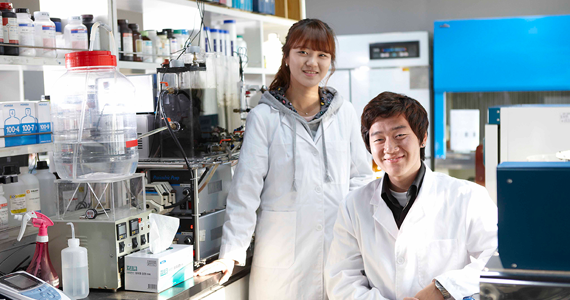Department of Environmental Engineering and Energy
The Department of Environmental Engineering and Energy is fostering advanced professionals that merges environmental engineering technology with energy engineering technology.
| Tel | 031-330-6686 |
|---|---|
| Fax | 031-330-6336 |
| Location | Engineering Building2 3F |
Introduction and Specialization
The Department of Environmental and Biotechnology, established in 1999, aims to foster advanced professionals that merge environmental engineering technology with energy engineering technology to go beyond the limits of traditional environmental engineering and follow current global trends
The goal is to educate advanced environmental professionals who are experts in fields including, environmental assessment and prediction, environmental health care and environmental biotechnology using the latest biotechnology techniques like genetic engineering and pollution treatment and prevention technology
As the importance of the energy field increases, the department reorganized the department into “Environmental Energy Engineering” in 2012, directly or indirectly related to the environment. Despite the short history, the department’s potential has been widely recognized and is supporting public research institutes like Center of Clean Energy and Technology supported by the ministry of industry and materials and Research Center of Environmental Technology in Kyounggi Region supported by the ministry of environment
In addition, it has been selected as a promising graduate school department in the BK21 project by the ministry of education since 1999, this allows students to receive scholarships. With these active efforts, the department is equipped perfectly with the best experimental equipment in the country and working hard to train research skills and life skills. The department is also active on providing practical industry-university collaborative education
The graduates are working at environmental organizations, environment-related enterprises, public and private research institutes, public enterprises and offices. The 1st graduates in 2003 recorded 100% employment.
Mission Statement
Mission Statement I (Expertise)
To foster professional workforce to fully understand underlying basic science and engineering principles of environmental biotechnology
- I-I. By taking basic courses required for engineering majors and Four core courses in the field of water, air, waste and environmental impact assessment. Graduates learn the overall theory on environmental engineering and are equip with professional skills.
Mission Statement II (Creativeness/Practice)
To foster creative talents who can apply scientific or engineering principles creatively to practical situations. By completing experiments, project courses and creating designs. This cultivates creative and practical engineering skills that apply to environmental biotechnology related principles, and research and development for real environmental issues.
- II-I. Ability to find solutions to environmental problems by applying principles related to environmental engineering
- II-II. Equipped with practical skills in environmental engineering, creative and practical capability of a research engineer, autonomously develop and apply their own skills with practical skills in the field of environmental engineering.
Mission Statement Ⅲ (Communication/Collaboration)
Develop communication skills to effectively share knowledge and technical ideas with others
- III-I To be able to externally present acquired knowledge and research achievement smoothly and efficiently, and share necessary information, students actively practice communication through activities including writing reports/papers, discussions in groups or giving oral presentations.
Mission Statement IV (Globalization)
To Cultivate talent possessing global minded qualities worthy of globalization
- IV-I. To widen the working area to the world stage, teach English, cultivate foreign language skills
- IV-II. Increase understanding of international culture, so to foster a positive sense of community.
History
| 2014.09. | Acquired the Research Center for the Construction of Integrated Disposal Management System from the Sea by Ministry of Oceans and Fisheries |
|---|---|
| 2012.11. | Moved from Baekma Hall to 2nd Engineering Hall |
| 2012.03. | Reorganized into department of Environmental Energy Engineering |
| 2010.12. | Passed Engineering Certificate Evaluation the environmental Engineering Intensive program |
| 2010.03. | Newly established energy engineering major in graduate school |
| 2009.09. | Appointed as a Designated Research Center (Energy Environment Convergence Technology Center) by the Ministry of Education, Science and Technology |
| 2007.03. | Reorganized into Department of Environmental Biotechnology |
| 2005.03. | Reorganized into Department of Environmental Biotechnology |
| 2004.08. | Attracted water treatment advancement team of Eco-Star Project from Ministry of Environment |
| 2002.03. | Reorganized into department of Environmental Biotechnology |
| 2000.12. | Appointed for a Gyeongancheon Research Project by National Institute of Environmental Research |
| 2000.07. | Appointed for Gyeonggi Regional Environmental Technology Development Center by Ministry of Environment |
| 2000.03. | Established Master and Doctor's Courses of Graduate School of Environmental Biotechnology |
| 1999.08. | Designated as a Graduate School in the field of science and technology by the Ministry of Education, Brain Korea 21 (BK21) |
| 1999.03. | Participated in Science foundation / Gyeonggi-do Regional Research Center(RRC) |
| 1999.03. | Acquired Clean Technology Institute (Environmental Research & Analysis Center) by the Ministry of Commerce, Industry and Energy |
| 1999.03. | College of Engineering, Environmental Biological Engineering |
| 1999.03. | Established Major of Environmental Biological Engineering in the Department of Ceramic Chemical Engineering |
Curriculum
Credits (Applied after 18)
Engineering Accreditation Credits (Intensive Course)
| Specialty Liberal Arts | MSC | Major(Design) | General Optional | Total |
|---|---|---|---|---|
| 21 | 30 | 70(12) | - | 134 |
Non-accreditation credits (Ordinary Course)
| Common Liberal Arts | Essential Liberal Arts | Basic Liberal Arts | General Liberal Arts | Major | General Option | Total |
|---|---|---|---|---|---|---|
| 17 | 12 | 15 | 10 | 70 | 10 | 134 |
Engineering Accreditation Specialty Liberal Arts and MSC Subjects (Intensive Course)
| Specialty Liberal Arts | MSC |
|---|---|
|
|
Students who have excellent grades in English according to level class at Bangmok College of General Education, will take English 3/4 instead of English 1/2 and English Conversation 3/4 instead of English Conversation1/2.

